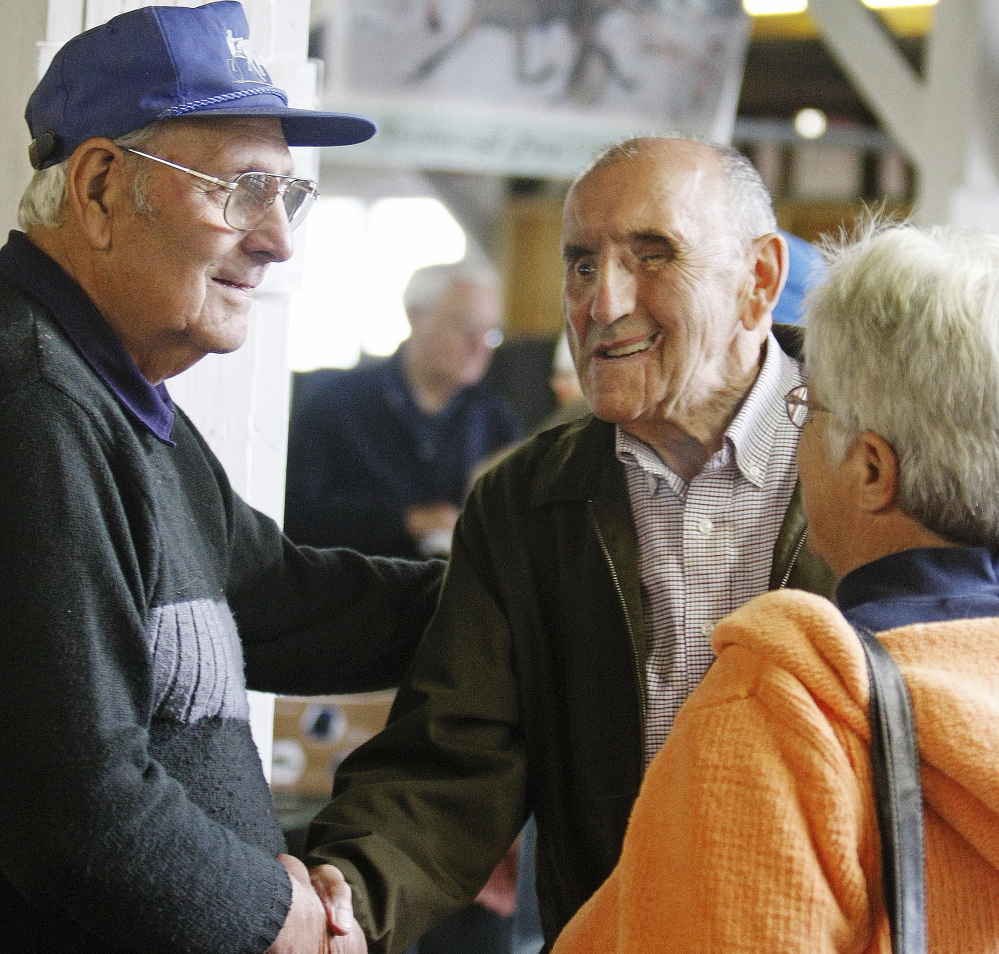CUMBERLAND — Donnie Richards wouldn’t die. Half his face was gone, including his jawbone, teeth, an eye and so much blood. He had been kicked in the face by a 2-year-old colt he was training at the Cumberland Fairgrounds eight long months ago in early January.
A friend held Richards in his arms while they waited for the ambulance and EMTs. Others in the harness racing community that trains and stables its horses at the fairgrounds cried and prayed. Richards was part of the soul and the backbone of the sport.
He still is. Sunday, the tears were joyous and the embraces heartfelt for the 81-year-old horseman who still trains horses. The 143rd Cumberland County Fair opened its gates for its eight-day run with Donnie Richards Day. After weeks in a medically-induced coma and several months at Maine Medical Center, Richards walked around the grandstand area next to the start-finish line.
He never minded being the center of attention while sitting behind one of his race horses. On foot was another matter. “I’ll be fine,” Richards said Saturday afternoon at his home in the heart of Yarmouth.
“I’ll get through it. I want to thank everyone who helped me and supported me. That’s what’s important.”
When, in fact, Richards was always helping and supporting others.
Friends and fans coming to the fair were encouraged to wear orange and black, the colors of Richards’ racing silks. “They’re North Yarmouth Academy’s colors,” said Richards, proudly. He graduated from NYA in 1951 when it was the public high school in Yarmouth.
Sunday, Richards was conspicuous by not wearing orange and black. That would be overdoing it.
Strangers might find him stoic and maybe a little cantankerous. Friends say he is loyal, generous and truthful. “He’s harmfully honest,” said Tom Dillon of Skowhegan, a longtime horse owner and friend. “Harmfully, because he’d tell you what he thought after you just spent all that money for a horse that wasn’t very fast.”
Dillon laughed because this was a day to be happy. Richards was alive. Walter Hight, also a horse owner from Skowhegan, remembers the moment he heard the news about Richards’ injuries. “It was like a knife through my heart.”
When Richards was allowed to have visitors, Dillon went to the hospital. “People usually embellish news like this,” said Dillon. “I was telling myself, it can’t be that bad. “When I saw Donnie, it was that bad.”
Diane Perkins, a former teacher and coach at Sacopee Valley High and a life-long horsewoman, said she felt ill when she first heard of the accident. She prayed. “Oh, my God, help him, help those around him.”
Richards said he doesn’t remember much about the incident. He was trying to hitch Tommy Bar when the colt reared on its hind legs. It had horseshoes with spikes, and Richards’ face was torn and smashed.
“When I was able, I asked the doctors how bad was it on a scale of 1 to 10,” said Richards. “‘Nine’, they said. It was bad.”
He faced multiple surgeries to reconstruct his face. He had to learn to talk, swallow and breathe correctly. He is conscious of his ability to speak, but during a two-hour visit Saturday he was easily understood.
He lives in the home his father bought some 80 years ago. It was formerly a Catholic church. “When I was in school, I knew 12 people who raced horses just in Yarmouth. My father was a logger, we worked with horses.”
Certainly the draft horses were not standardbreds, but Richards learned to understand the animals. He also understood the hard work of logging.
“I’d get paid by my father on Friday and was broke on Monday,” said Richards. “My father said I’d go broke racing. Well, I’d have more fun.”
Richards stabled four of his horses in his backyard shed. He trained them on the dirt street in front of his house on Cumberland Street. “Back then (in the 1950s) I could lie down after 5:30 in the middle of Main Street and no one would bother me.”
Richards won more than 4,300 races as a driver, a prodigious number. He won more than $4 million in earnings, but a driver’s share is typically 5 percent. That Richards could buy undervalued horses, train them and sell them for a higher profit made him financially successful.
“People ask me if I was sorry I sold all those horses. No, but I’ve been sorry I bought some.”
Sunday was Donnie Richards Day. Bill O’Donnell, a Canadian and one of the top drivers in the sport in the 1980s, flew to Maine to see his friend. “I think he’s part horse. He shoes them, trains them, drives them. He helps others. When I came to race in Maine, he shared a lot of information with me.
“I’d see him at Rockingham (in New Hampshire) and Foxborough (in Massachusetts) and everyone knew him. He’d bring five or six horses and they were winners. Donnie could have moved on. He was that good. He always wanted to go back to Maine.”
Richards remembers the woman who hugged him, saying, “I’m so glad to see you.” Richards’ response? “I’m so glad to be seen.”
Send questions/comments to the editors.


